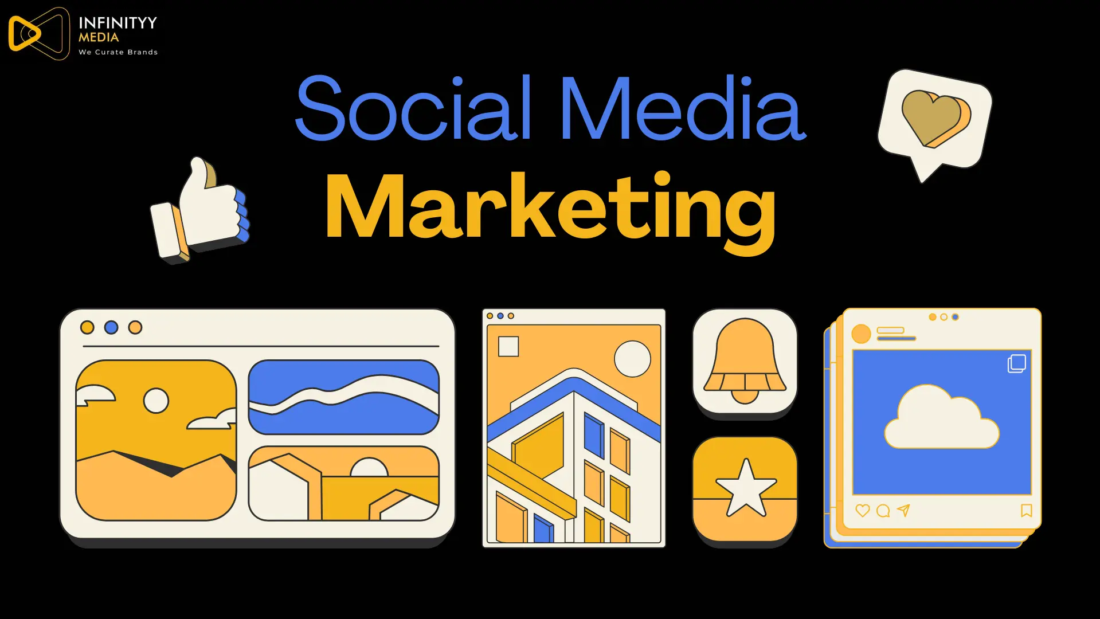In a rapidly digitalizing world, Guwahati, the gateway to Northeast India, is no longer behind when it comes to online brand visibility. Whether you’re a local business, a startup, or an established enterprise, social media marketing (SMM) is no longer optional—it’s essential. And that’s where Infinityy Media, a full-stack digital agency, comes in.
Having worked with over 200 clients across industries like healthcare, education, F&B, real estate, and e-commerce—including names like RD Elettronica (Italy), Coras by Pratiksha and Prabhuji, Infinityy Media brings a data-driven, creative-first approach to social media marketing.
Why Social Media Marketing Matters in Guwahati
Guwahati has witnessed a digital transformation in recent years:
- 65% of internet users in Assam access social media daily.
- Platforms like Instagram, Facebook, YouTube, and LinkedIn are influencing consumer behavior and buying decisions.
- Local brands are now competing with national ones—not just in products, but in content and engagement.
Whether you’re a tea brand in Dispur, a boutique in Zoo Road, or a health clinic in Six Mile, your audience is online—scrolling, watching, engaging.
What Makes Infinityy Media Different?
Unlike cookie-cutter agencies, Infinityy Media customizes SMM strategies to fit your business goals, industry trends, and customer behavior. Here’s how we stand out:
1. Creative Content That Converts
From quirky reels to thought-provoking carousels, we craft platform-specific content that sparks conversation and drives results.
🧪 Case Study: For Freshdo, a D2C grocery delivery platform, our monthly 6-reel strategy during Durga Puja led to a 230% increase in engagement and 2x sales during the festive season.
2. Targeted Paid Campaigns with ROI Focus
We don’t just boost posts. We run performance-driven ad campaigns across Instagram, Facebook, and Google—tracking every click, impression, and conversion.
🎯 Case Study: For Detailing Devils, a automobile detailing studio, we generated 50+ qualified B2B leads with a ₹10,000 test budget in just 10 days.
3. Strategic Growth, Not Just Vanity Metrics
Infinityy Media helps you build a community, not just followers. We focus on engagement, retention, and brand storytelling—things that bring repeat customers.
💬 Case Study: With RD Elettronica, a B2B component manufacturer based in Milan, Italy. We restructured their website and content strategy. This resulted in a 400% rise in inquiries through organic channels alone.
Industries We Serve in Guwahati (and Beyond)
- 🧳Healthcare – Clinics, hospitals, health tourism, wellness brands
- 🛍️ Retail & D2C Brands – Fashion, wellness, lifestyle products, consumer goods
- 🧳 Travel & Hospitality – Tour operators, hotels, homestays, travel aggregators
- 🚗 Automotive – Dealerships, electric vehicle startups, auto components manufacturers
- 🛠️ Industrial & Components – B2B manufacturers, electronic components, factory equipment
- 🏢 Education – Schools, colleges, edtech platforms
- 🥘 F&B – Restaurants, cloud kitchens, FMCG brands
- 🏗️ Real Estate – Developers, agents, co-living and rental platforms
- 🌐 Technology & SaaS – Tech startups, IT service companies, enterprise software
- 🎧 Media & Entertainment – Artists, music labels, event organizers
Infinityy Media doesn’t believe in a “one-size-fits-all” model. Every strategy is custom-built for your audience and business goals.
Why Choose Infinityy Media for Your Social Media Needs?
✨ 10+ Years of Combined Experience
🌏 Clients Across India, Europe and Middle East,
🚀 Strong Focus on Performance + Creativity
🧠 Deep Industry Knowledge
💼 Personalized Account Management
Whether you’re a startup or an enterprise, we scale your growth with smart social media strategies and performance-first thinking.
Ready to Elevate Your Brand in Guwahati?
If you’re looking for a partner to take your brand visibility, leads, and engagement to the next level, Infinityy Media is your go-to social media marketing agency in Guwahati.
Let’s build something great together.
📩 Email: [email protected]
🌐 Visit: www.infinityymedia.com
Frequently Asked Questions (FAQs)
Q1. Can you handle content in Assamese or regional languages?
Yes! We localize your brand content in Assamese and other Indian languages based on your target audience.
Q2. Do you offer influencer collaborations in Guwahati?
Yes, we collaborate with niche micro and macro influencers in the region.
Q3. Can you help generate leads for a service-based business?
Absolutely! We specialize in lead-gen campaigns for real estate, healthcare, and B2B clients.




